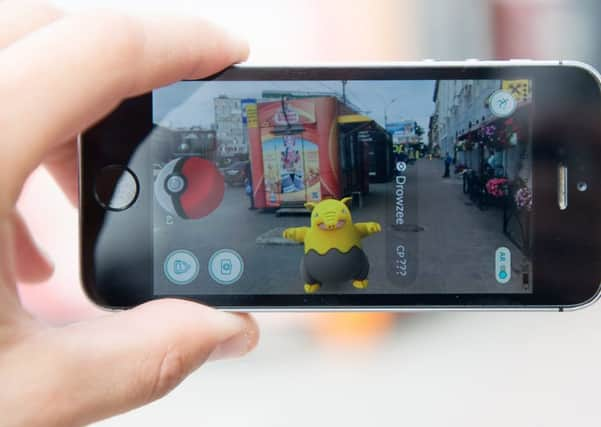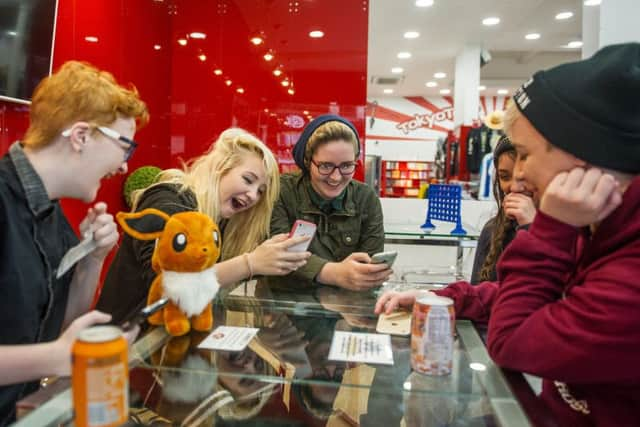The Scottish gamers who trail-blazed Pokemon Go
This article contains affiliate links. We may earn a small commission on items purchased through this article, but that does not affect our editorial judgement.


Scotland is firmly on Niantic’s radar. Last year Edinburgh took part in a large augmented reality battle as the Enlightened fought to rescue researchers and scientists kidnapped by the leadership of the Resistance. One of the earliest game events, “Save Klue”, happened in 2013 in Stirling by the Wallace Monument and focused on the fate of the in-game character play by Glaswegian actress Katy Townsend. In the video below Katy’s character, Klue, makes a pitch for the Enlightened.
This original augmented reality game is called Ingress. Niantic have been running it for three years and have used this time to refine and develop code and their event management skills. Scottish Ingress players have contributed data and photographs that are now used in Pokemon Go.


Advertisement
Hide AdAdvertisement
Hide AdIn Ingress two factions battle over control of portals, in the early years these portals were created by players, and Niantic has taken a chunk of this gamer submitted data to create PokeStops and locations in Pokemon Go. There’s not a trivial chance that the PokeStop or Gym near you was created by a veteran Ingress agent like StewieG, McWibble or Bhands.
So what do Scotland’s Ingress players make of Pokemon Go? Especially as the game includes locations they’re already familiar with. A survey of Enlightened players reveals some interesting results. A whopping 96% of Ingress players recognise the advantage their knowledge of portal locations and the nuances of location based gaming gives them in Pokemon Go.
An equally high number, 98%, recognise that Pokemon Go’s success will help Niantic but only 57% of Scottish players think Ingress will benefit from all the attention. In fact, the Ingress survey reveals that
47% of Ingress players in Scotland are yet to give Pokemon Go a shot. Over a quarter of gamers said they might try Pokemon later, though.


There are some key differences between Pokemon Go and Ingress. Pokemon Go has three factions while Ingress only has two. Which works better? It seems it is too early to tell; 57% of Scottish augmented reality veterans preferring to wait before making a decision.
Scotland may seem like an unlikely spot for a keen interest in augmented reality gaming but it does well. Nearly 85% of Ingress layers say there’s a lot to do outside in Scotland and these games encourage you to discover them although nearly 20% sound note of caution over the weather.
Scotland also has a thriving games development community. The location-based alternative reality sound game “Other” picked up an Arts Business Scotland Digital Innovation Award in 2014. Other, created by Quartic Llama in partnership with the National Theatre of Scotland, used sound, interaction and location to turn exploring Dundee in an adventure that blurred reality and fiction.
Malath Abbas, founder of Biome Collective and board member of IGDA Scotland, is positive when it comes to Scotland’s future role in the new genre.
Advertisement
Hide AdAdvertisement
Hide Ad“Augmented reality and location based games open up amazing opportunities for everyone including players and game makers.
“As game makers we’re focused on pushing the medium in new directions to excite and expand our audience.
“Marketers are clearly keen to explore field this as it offers new ways to access and engage audiences. “Small agile studios across Scotland are ideally suited to tackle the challenges associated with new technology such as AR.”
Biome Collective are working on an augmented reality game of their own. While that development is at an early stage, yet to be named in public, is believed the game will build on earlier Scottish successes like Other and dramatically widen the number of locations involved.
Andrew Girdwood is Head of Media Technology at Cello Signal and an Enlightened agent in Ingress.
DOWNLOAD THE SCOTSMAN APP ON ITUNES OR GOOGLE PLAY
